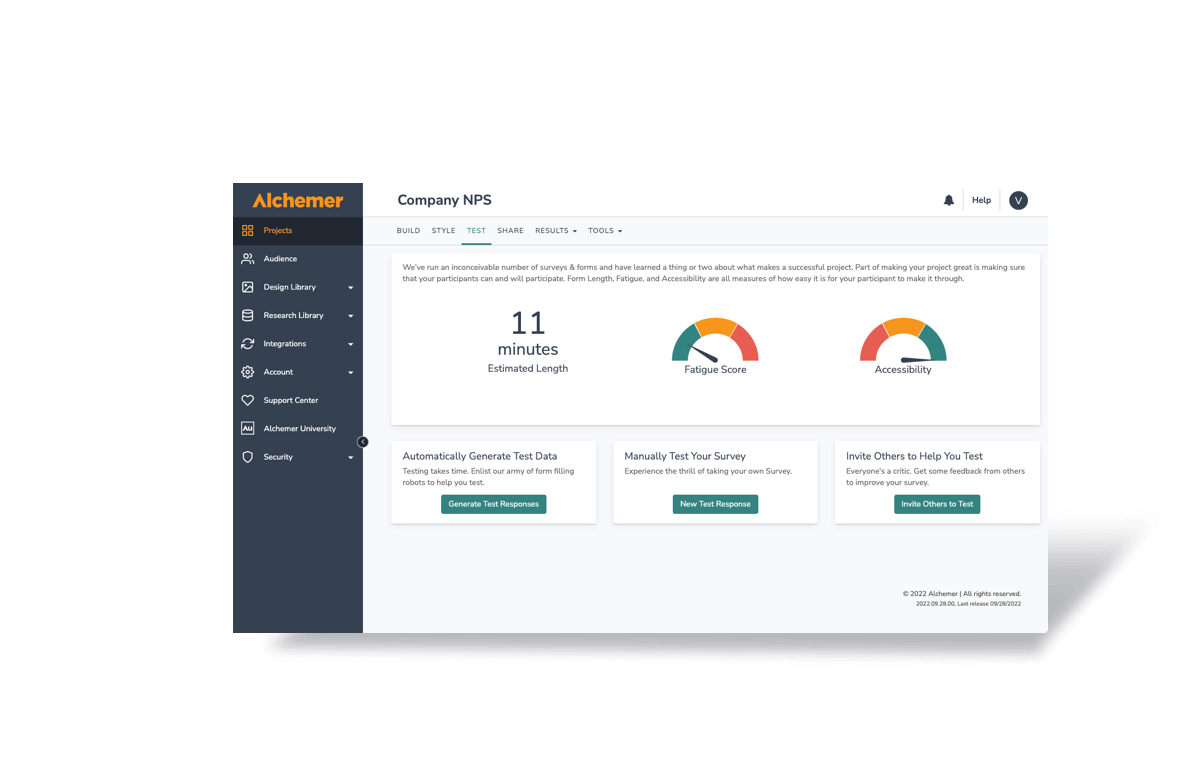Starting your survey design process without first establishing goals or objectives is sort of like starting on a journey to a new place without your GPS (or map if you roll old school).
You might still make it to your destination, but your chances of getting there safely and efficiently go way up if you’ve got the right guidance.
So today we’ll be getting back to basics and going over the all-important first step in survey design: establishing goals and objectives.
To give you some good concrete examples, we’ll be using our own October-themed survey: The Alchemer Zombie Apocalypse Plan.
The Importance of Survey Objectives to Your Survey Design
Today I want to talk about one of the most important steps you can take in the survey design process: identifying your survey objectives.
First and foremost, your objectives need to be as specific as possible. A close second place priority: they need to be measurable by an online survey.
If one of your objectives is to find out why people who don’t use the internet don’t use the internet, then using an online survey might not be the most effective method.
Writing a statement of the overall goal of your survey can be a good place to start if you’re having trouble identifying specific objectives.
In our example, the survey goal might be:
“To assess the Alchemer staff’s satisfaction with the current Zombie Apocalypse escape plan.”
Using that goal we might identify objectives such as:
- “How satisfied is the staff with the availability of zombie neutralizing weapons?”
- “How satisfied is the staff with the planned escape routes?”
- “How satisfied is the staff with availability of emergency rations?”
- “How satisfied is the staff with the Zombie Awareness Initiative?”
Getting Outside Input For Your Objectives to Inform Survey Design
At this point in the process, it can sometimes be helpful to bring in a methodology expert, someone experienced in survey design who understands the market or audience research process.
I shared both my survey goal and objectives with a highly experienced researcher, and he suggested that we get more specific with our final objective, “How satisfied is the staff with the Zombie Awareness Initiative?”, by making it more specific.
Even if you don’t have market research connections, it’s a good idea to get stakeholder buy-in for your survey objectives before you start distributing the survey. Outside eyes can spot holes or vagueness that you may not see if you’re the one who wrote the goals or objectives.
And survey objectives are vital because they affect everything in the survey process, from how we word the questions and what questions we ask, to the look and feel of the survey.
If our objective was to know how the zombies felt about our escape plan, then we’d probably style the survey in blood reds with nice little brain pictures. However, from our objectives, we know that we’re appealing to the Alchemer staff, so the look of the survey will be quite different (and the questions will include a lot less groaning).
Using Survey Objectives to Guide Your Survey Design
Now that we have our goals and objectives, we can get ready to actually begin our survey design. Before we write questions it’s a good idea to make sure we’re confident in our understanding of the subject of the survey; this usually takes the form of research, consultation, or both.
Survey Topic Research
For our zombie preparedness survey, we’ll need to make sure we understand a possible zombie apocalypse in order to write insightful questions that help us achieve our survey objective.
There are books and papers on zombies, zombie documentaries, and zombie websites. As with most topics, the issue isn’t finding information, it’s choosing the right information to believe.
Think back to your academic days. If you wouldn’t have used a source for an academic paper, you probably don’t want to use it for your survey research. Remember, not all information is trustworthy (especially on the internet), and some has an inherent bias.
Consulting a Subject Matter Expert
Once you feel confident that you’ve reached a good level of understanding with your survey subject, you may want to take the extra step of consulting an expert in the field.
In some cases you may not need this step; your research and experience may suffice to get you all the insight that you need. But don’t hesitate to conduct an important survey just because you yourself aren’t well-versed in a topic.
Experts are likely to be flattered if you ask them to review your survey, and you can always offer them a first peek at the data to give them some reward for their valuable time.
We could send our Zombie Apocalypse Plan survey to a doomsday prepper, or the author of some famous zombie novels, to make sure we’re asking the right questions in the right way.
Survey Objectives Are a Foundational Element of Quality Survey Design
Regardless of the kind of survey that you’re doing, start with the goals and objectives in mind.
Use these as a roadmap during your survey design, and don’t hesitate to ask for directions from experts in survey methodology or your survey’s subject to make sure you reach your destination safely (and without a zombie attack).




